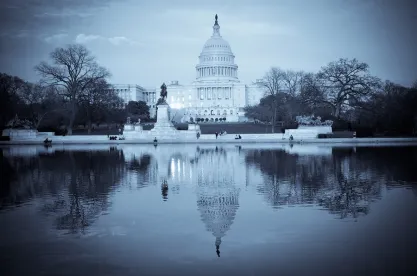The past several weeks have given rise to an unprecedented flurry of new legislation and government agency actions in response to the coronavirus pandemic. This Legal Update summarizes key provisions of the Families First Coronavirus Response Act (the “FFCRA,” enacted on March 18, 2020), the Coronavirus Aid, Relief, and Economic Security Act (the “CARES Act,” enacted on March 27, 2020), as well as certain actions taken by the Internal Revenue Service and the Department of Labor that directly impact employer-sponsored retirement plans, group health plans, flexible spending accounts, and health savings accounts.
Retirement Plans
Coronavirus-Related Distribution Added as a Permitted Distribution Event (CARES Act Section 2202(a))
For 401(k) plan, 403(b) plans, and government-sponsored 457(b) plans, the list of permitted distributions has been expanded to include a coronavirus-related distribution that is taken during 2020. A “coronavirus-related distribution” is a distribution made to an individual (1) who is diagnosed with the virus SARS-CoV-2 or with coronavirus disease 2019 (“COVID-19”) by a test approved by the Centers for Disease Control and Prevention; (2) whose spouse or dependent is diagnosed with SARS-CoV-2 or COVID-19 by such a test; or (3) who experiences adverse financial consequences as a result of quarantine, lay-off, reduced hours, inability to work due to child care due to SARS-CoV-2 or COVID-19, closing or reducing hours of a business owned or operated by the individual due to SARS-CoV-2 or COVID-19, or other factors as determined by the Secretary of Treasury. An employer may rely on a plan participant’s certification that one of these conditions is satisfied.
Eligible distributions are limited to $100,000 for any taxable year. The $100,000 limit is applied among all plans in an employer’s controlled group; if an employer sponsors multiple plans, a participant may receive an aggregate of $100,000 in distributions from all plans, and not a $100,000 distribution from each plan. Any distribution received will be included as income, ratably over a 3-year taxable period, unless the taxpayer elects to include all of it as income in the year of distribution.
Coronavirus-related distributions generally are not considered eligible rollover distributions, and are therefore not subject to 20% federal withholding for payment of taxes. A participant who receives a coronavirus-related distribution, however, may repay some or all of the distribution and have the portion repaid treated as a rollover for tax purposes. The repayment must occur during the 3-year period beginning on the day after the date on which he/she received that distribution. The repayment may be made to any eligible retirement plan that could receive a rollover. The effect of repayment is that the participant defers tax on the portion of the coronavirus-related distribution that he/she repays timely.
Suspension of Retirement Account Early Withdrawal Penalties (CARES Act Section 2202(a))
The 10% penalty for early withdrawals from qualified retirement plans (such as 401(k) plans, 403(b) plans, and individual retirement accounts) will not apply to coronavirus-related distributions (as defined above) that an individual receives during 2020 up to $100,000.
Expansion of Loans from Retirement Plans (CARES Act Section 2202(b)(1))
Generally speaking, a participant in a retirement plan may not take loans from the plan that exceed the lesser of $50,000 or 50% of the participant’s vested account. The CARES Act increases the maximum amount that a qualified individual can borrow from his or her retirement plan account to the lesser of $100,000 or 100% of the participant’s vested account. The increased limit applies for plan loans taken within 180 days after the March 27, 2020 date of enactment of the CARES Act.
A qualified individual is anyone (1) who is diagnosed with the virus SARS-CoV-2 or with coronavirus disease 2019 (“COVID-19”) by a test approved by the Centers for Disease Control and Prevention; (2) whose spouse or dependent is diagnosed with SARS-CoV-2 or COVID-19 by such a test; or (3) who experiences adverse financial consequences as a result of quarantine, lay-off, reduced hours, inability to work due to child care due to SARS-CoV-2 or COVID-19, closing or reducing hours of a business owned or operated by the individual due to SARS- CoV-2 or COVID-19, or other factors as determined by the Secretary of Treasury.
Plan Loan Repayment Delay (CARES Act Section 2202(b)(2))
If a qualified individual (as defined above) has plan loans that are outstanding on or after the enactment of the Act, any payments that are due during the period beginning on the enactment of the Act and ending on December 31, 2020 shall be delayed by 1 year. This rule does not appear to be optional and applies to both new loans taken after, and loans existing on, the effective date of the CARES Act. Subsequent payments are adjusted to reflect the payment delay and any interest that accrues as a result of the delay. For purposes of applying the five-year repayment rule that normally applies to participant loans and the loan repayment period otherwise applicable to the loan, the one-year delay is disregarded.
It is not clear whether plan participants who are qualified individuals must request the payment delay. An employer might not know if a participant is a qualified individual based on a diagnosis of the SARS-CoV-2 virus or COVID-19, but the employer would know if a participant is a qualified individual because he/she has been laid off due to the economic downturn caused by COVID-19. We anticipate that the IRS will provide additional guidance.
Waiver of Required Minimum Distributions from Defined Contribution Plans (CARES Act Section 2203)
The CARES Act includes a provision pursuant to which required minimum distributions (“RMDs”) from defined contribution plans, such as 401(k) plans and 403(b) plans, are waived for calendar year 2020. This RMD waiver also applies to RMDs that are due by April 1, 2020 for individuals who turned age 70½ in 2019 but have not yet received those RMDs. Please see our Legal Update entitled "Retirement Plan Benefits: The CARES Act and Other Tax Planning Considerations" for further information.
Delay of Required Pension Plan Contributions (CARES Act Section 3608(a))
Minimum pension plan contributions otherwise required under Internal Revenue Code (“Code”) section 430(a) for 2020 can be delayed until January 1, 2021. If such contributions are delayed, the contributions must be increased by interest at the pension plan’s rate in effect for the plan year for which the payment was originally due (i.e., from the original due date until the actual contribution date).
Maintenance of Pension Plan’s Funding Percentage (“AFTAP”) (CARES Act Section 3608(b))
Code section 436 provides that if a defined benefit plan’s adjusted funding target attainment percentage (“AFTAP”) falls below 80%, its ability to pay certain optional forms of payment, such as lump sum distributions, is restricted. More severe restrictions and requirements apply if the plan’s AFTAP falls below 60%. Under the CARES Act, a plan sponsor may elect to treat the plan’s AFTAP for the last plan year ending before January 1, 2020, as the AFTAP for plan years that include calendar year 2020. Given the recent volatility in the financial markets, plans that might otherwise go into restricted status can avoid that result if they were not in restricted status in the last plan year ending before 2020.
Extension of Remedial Amendment Period for 403(b) plans
The IRS is extending the last day of the initial remedial amendment period for Section 403(b) plans from March 31, 2020, to June 30, 2020. Plan sponsors now have until June 30, 2020, to update their pre-approved and individually designed 403(b) plan documents to conform with the written plan document requirements of the Code and applicable regulations.
Extension of Deadline to Adopt Pre-Approved Defined Benefit Plan
The IRS is extending the following deadlines to July 31, 2020: (1) the April 30, 2020, deadline for employers to adopt a pre-approved defined benefit plan and to submit a determination letter application (if eligible) under the second six-year remedial amendment cycle; and (2) the April 30, 2020, end of the second six-year remedial amendment cycle for pre-approved defined benefit plans.
Group Health Plans
Coverage of COVID-19 Diagnostic Testing (FFCRA Section 6001, CARES Act Section 3201)
Group health plans, both insured and self-funded, as well as grandfathered plans under the Affordable Care Act, are required to cover diagnostic products for the detection of the SARS–CoV–2 virus or the diagnosis of the virus that causes COVID–19 without deductibles or other cost-sharing and without prior authorization or other medical management requirements. Such plans are also required to cover items and services furnished to an individual during health care provider office visits (including telehealth visits), urgent care center visits, and emergency room visits that result in an order for or administration of a diagnostic product described above, but only to the extent such items and services relate to the provision of the diagnostic test or the evaluation of an individual to determine whether a test is necessary.
Continuation of Health Coverage (Department of Labor Q&As for FFCRA, Q&A #30)
Continuation of health coverage is a concern for both employees and employers. On March 28, 2020, the Department of Labor issued a series of questions and answers under the FFCRA. The Q&As do not modify the current rules governing continuation of health coverage, but the guidance does explain how those rules will be applied to leave under the Emergency Family and Medical Leave Expansion Act (the “EFMLEA”) portion of the FFCRA. Specifically, with respect to leave under the EFMLEA, the guidance provides that an employee is entitled to continued group health coverage on the same terms and conditions as if the employee continued to work; meaning that the employee must be allowed to continue the same level of coverage, but generally will also be required to continue to pay their portion of the applicable premium or cost.
The guidance also clarifies that an employee who does not return to work at the end of the leave or exhaustion of their entitlement under the EFMLEA may be able to continue coverage under the Consolidated Omnibus Budget Reconciliation Act (“COBRA”) or under State laws that are similar to COBRA.
Flexible Spending Accounts/Health Savings Accounts
Reimbursement of Over-The-Counter Medications (CARES Act Section 3702)
The rules applicable to health care flexible spending accounts (“FSAs”) and health savings accounts (“HSAs”) have been changed to allow for the reimbursement of over-the-counter medications from those accounts without a prescription. This change is a permissible change to a health FSA and it could apply to any expense incurred after 2019. To permit these reimbursements, employers likely would need to amend their flexible benefit plan.
High Deductible Health Plans and Telehealth Coverage (CARES Act Section 3701)
A health plan that otherwise satisfies the requirements of a high deductible health plan (HDHP) will not fail to be an HDHP merely because, for plan years beginning on or before December 31, 2021, the plan covers telehealth and other remote care services without a deductible.
High Deductible Health Plans and Expenses Related to COVID-19 (IRS Notice 2020-15)
A health plan that otherwise satisfies the requirements of a high deductible health plan (HDHP) will not fail to be an HDHP merely because the health plan covers testing for and treatment of COVID-19 without a deductible, or with a deductible below the minimum deductible for an HDHP. Therefore, an individual covered by the HDHP will not be disqualified from making tax-favored contributions to a health savings account (HSA).




 />i
/>i
